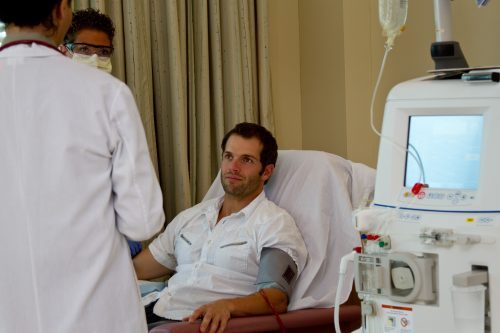
Monogram Health CMO sees many opportunities to improve care for people living with chronic kidney and end-stage renal disease (ESRD).
Recent data show an estimated 37 million Americans, (one in 7 adults, or up to 15% of the US adult population) are affected by chronic kidney disease (CKD).1 Another one in three adults are at risk for developing CKD, which can be driven by comorbid conditions such as hypertension and diabetes. This heavy public health burden is also expensive. The costs of caring for individuals with kidney disease represent around 20% ($114 billion) of traditional Medicare expenditures, and these costs continue to rise.2
Unfortunately, the downstream effects of kidney disease and renal failure are poor health outcomes and decreased quality of life, which are often compounded by barriers to accessing essential care, as well as a “volume-first” health care system that remains deeply entrenched
Prior to joining as the medical director (and later CMO) of Monogram Health, I was a practicing nephrologist in a charity hospital system in Louisiana, caring for patients with CKD and end-stage renal disease (ESRD). I saw first-hand the impact prevalent and poorly managed kidney disease can have on individuals, families, communities, and the broader health care system. It was during these years that I developed a passion for population-based health that has remained a focus of mine throughout my professional life. So, it was serendipitous that while serving as president of the National Kidney Foundation of Louisiana, I met Monogram Health CEO Mike Uchrin and discovered we shared a common desire to do more for high-risk kidney patients—in their own homes.
Monogram now operates in more than 30 states, deploying an innovative care model that is improving the lives and health of this patient population.
Disrupting Dialysis
When you think about common treatments for CKD and ESRD, dialysis comes to mind. Dialysis care is usually delivered in either an emergency department, an acute care setting, or a dialysis center. This means a significant portion of a patient’s care is transferred from their home environment to an off-site location they’ll need to visit several times a week for the duration of their life, or until they receive a transplant. In-center dialysis is the most cost-, resource-, and time-intensive intervention in the nephrologist’s arsenal. We are upending that model to bring care back into the home.
Monogram seeks to fill a systemic gap and transform the way patients with kidney disease are treated to help slow progression of the disease and ensure increased access to evidence-based renal care for more individuals as early as possible. We believe in-center dialysis should not be a first-line therapy but a last resort. We focus exclusively on managing CKD and ESRD in the home, transforming care so a kidney disease diagnosis is no longer synonymous with dialysis and patients can enjoy better outcomes and better quality of life.
In fact, one of the unique aspects of Monogram’s model is that we are not in the dialysis business at all. We care about the appropriateness of dialysis, and we do not derive any income from it when dialysis is the right option for our patients. This allows us to stay focused on the evidence-based pathways that are most appropriate for each individual.
New Practice Model
Another unique attribute of Monogram’s approach is our nonreliance on clinical contractors for care delivery. All our clinicians are full-time employees of Monogram. We employ a clinical practice of nephrologists as well as cardiologists, geriatricians, endocrinologists, internal medicine specialists, nurse practitioners, social workers, and pharmacists. These expert clinicians are empowered to drive patient care—diagnosing and treating kidney disease right in the patient’s home and, when necessary, guiding care teams in the field through all types of evidence-based complex case management and disease management care pathways.
In addition to home doctor visits, our teams deliver a suite of tech-enabled clinical services including in-home care management, medication therapy management, family counseling, advance care plans, nutrition management, referral management, remote monitoring/biometrics, telehealth, concurrent hospitalization review, and post-discharge follow-up. Our artificial intelligence (AI) platform and industry-leading medical economics analytics identify individuals with kidney disease earlier, as well as those at high risk for progression, and identify gaps in evidence-based medical care and medication therapies. These insights enable Monogram to deliver care to delay the progression of CKD, avoid hospital admissions and readmissions, and avoid crashes into dialysis while increasing patients’ access to evidence-based care pathways.
Perhaps a patient isn’t thriving and could benefit from conversion to in-home dialysis. Maybe they’re stuck in a transplant logjam and need to lose some weight. Busy nephrologists and specialists may not have time to manage these things, but Monogram’s social workers can engage with the patient’s dialysis social workers and physicians. We can step in, assess and assist to ensure the patient succeeds.
Guided By Expertise
This past spring, we launched a distinctive and independent Clinical Advisory Board consisting of 25 of the nation’s leading clinician executives covering a variety of areas of expertise, including nephrology, emergency medicine, geriatrics, health plans, academic medical centers, device manufacturers, and research ecosystems. Our Board of Directors includes industry-leading talent and thought leaders, and is led by former Senate Majority Leader Bill Frist, MD, a former heart and lung transplant surgeon, and cofounder of the company.
With the support of the Clinical Advisory Board, we ensure our work is firmly grounded in evidence-based care guidelines, which drive quality outcomes and reduce costs. Our model disrupts where health care dollars go and improves affordability across the health care continuum.
Bringing It Home
Bottom line: we are transforming the way kidney disease care is delivered. It’s long overdue, and we’ve created a model that works. I believe it’s the winning combination of high-quality, in-house nephrology expertise and an innovative approach to staffing and care delivery that have allowed us to become the only value-based provider of in-home nephrology care operating across 33 states.
There is more than one pathway to delivering the highest quality individualized care for each patient’s unique needs. When we can create alignment for all stakeholders involved in the patient’s care and rely on the clinical evidence to determine the most appropriate care, the result is a win for the patient, the nephrologist, and ultimately, the entire health care system.
References
- 2020 Chronic Kidney Disease Fact Sheet. National Kidney Foundation.
- Advancing American Kidney Health. US Dept of Health and Human Services. 2018.
Dr. Gupta is the chief medical officer of Monogram Health, and is a practicing internist and nephrologist in the greater New Orleans area. His practice focuses on the long-term management of chronic kidney disease and end-stage renal disease. He has a special interest in population health and has served as the state lead for hypertension and chronic kidney disease in Louisiana.







 © 2025 Mashup Media, LLC, a Formedics Property. All Rights Reserved.
© 2025 Mashup Media, LLC, a Formedics Property. All Rights Reserved.